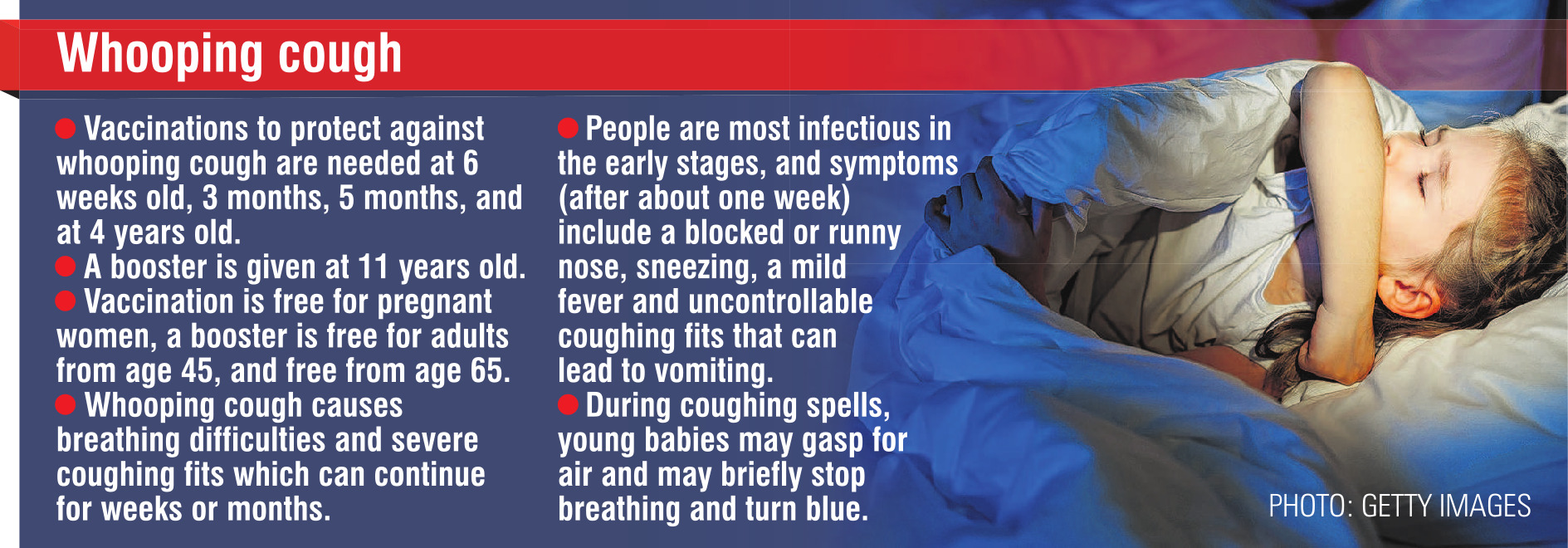
In the four weeks to November 14, the Southern district health region recorded "a concerning" 42 cases of whooping cough and one person had been hospitalised.
The latest Environmental Science and Research (ESR) pertussis report also showed 215 cases of the notifiable disease were recorded nationwide over the same time frame — the highest number of cases over a month to date this year.
It prompted health officials to declare a whooping cough epidemic last Friday, and implement a nationally co-ordinated response.
The health districts with the next-highest number of whooping cough cases were Capital and Coast (34), Canterbury (20) and Waitemata (18).
So far this year, Canterbury health district had recorded the most cases with 128, followed by Capital and Coast (99), Wairarapa (85).
Southern recorded 54 in total, the report showed.
Nationwide, from January 1 to November 8, a total of 836 confirmed, probable and suspect cases of cases of whooping cough were notified.
Of those, 88 cases were hospitalised. Fifty-five of those patients were younger than a year old.
So far this year, there have been no deaths, but three infants died from whooping cough in 2023.
It said whooping cough activity in New Zealand had returned to pre-Covid-19 pandemic levels after four years with very low activity because population immunity had reduced during the Covid-19 restrictions.
Whooping cough epidemics historically occur every three to five years in New Zealand, and the last epidemic ended in 2019.
WellSouth Primary Health Network clinical director Dr Carol Atmore said the increasing whooping cough cases in Southern areas, was "concerning".
"We have cases known to be confirmed in Central Lakes and Oamaru and these have been predominantly linked to school settings.
"It is highly contagious and each person with whooping cough passes the infection on to 12 other people on average."
She expected the numbers to continue to increase in the coming weeks.
"As we near the summer holiday period, getting your child or yourself vaccinated drops down the list.
"This, just as people will be spending time with families and travelling, often away from their usual healthcare provider.
"If your child’s immunisations are due before you head away for a holiday, make sure they receive them before you go, rather than waiting until after the holiday."
Dunedin Multidisciplinary Health and Development Study researcher and University of Otago respiratory epidemiology Prof Bob Hancox was also concerned about the Southern case numbers.
He said the number of immunised New Zealanders was "pretty poor" which meant there were many people of all ages who were vulnerable to whooping cough.
He said newborn babies were most in danger because they could not get their first vaccination until they were aged 6 weeks.
Until then, they were very prone to getting the disease.
Babies who contracted whooping cough had a higher chance of dying during this time, he said.
"Especially at the moment, with an outbreak going around, it is important for pregnant women to get the immunisation.
"If the mother is vaccinated during pregnancy, their immunity will be passed on to the baby and protect it until it can be immunised."
Public health physician and Otago epidemiologist Emeritus Prof Jennie Connor said the disease needed to be taken seriously because it could be "very serious" for children and older adults.
"People who are infected need to be kept away from others — keep away from daycare, school, work and social events.
"We can help prevent it messing up everyone’s Christmas holidays by acting quickly.
"Everyone can help slow the spread and protect the most vulnerable by getting vaccinated right away so they are less likely to get infected and pass it on."












